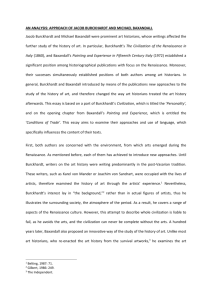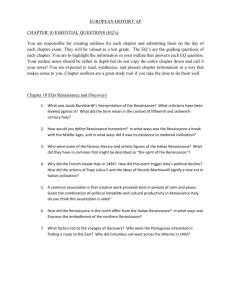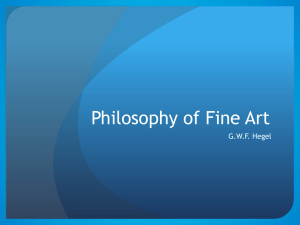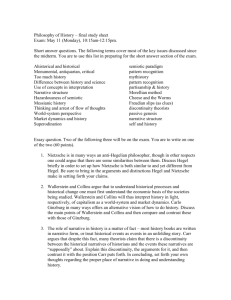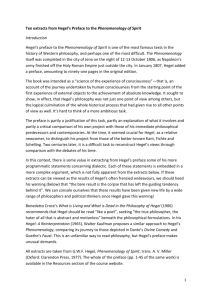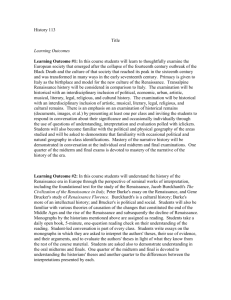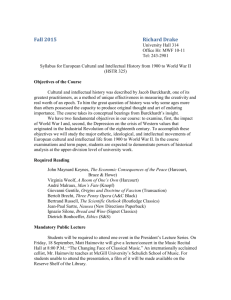Jacob Burckhardt: History as Education and Culture
advertisement
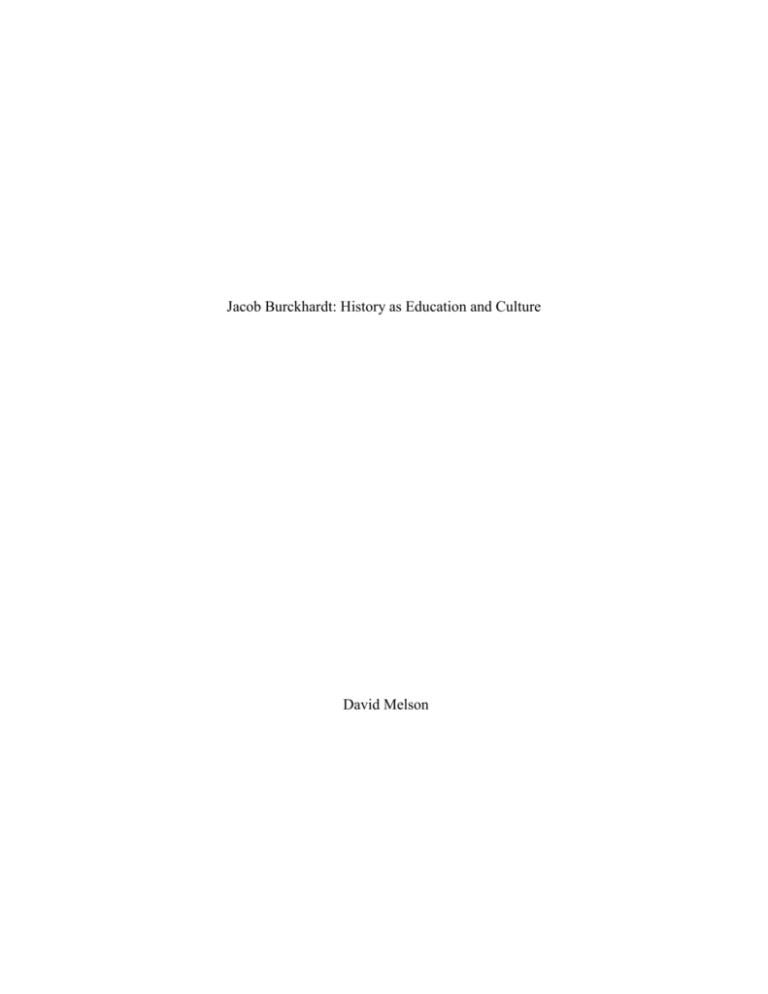
Jacob Burckhardt: History as Education and Culture David Melson In The Civilization of the Renaissance in Italy and The Greeks and Greek Civilization, Jacob Burckhardt developed a historiographic method that incorporated a criticism of Hegelian philosophy and his own background as an observer of social change in nineteenth-century Europe. His method, while critical of social problems and humanistic in theme, nonetheless, advocated a uniquely conservative doctrine. Simultaneously attacking Prussian autocracy and the spirit of liberal revolutionaries, Burckhardt looked to both his Swiss background and antiquity to counter what he believed to be the undoing of Europe. Furthermore, by examining the relation of contemporary culture to the cultures of the past, he developed a view of history that sought to benefit modern peoples, cultures, and governments. Knowledge of history, in Burckhardt’s estimation, formed the very identities and essences of the peoples of Europe. Forgetting the past would only lead to disaster. Chronologically, the historical works of Jacob Burckhardt lie near the end of the nineteenth century. He lived and worked during final decades of a century that saw European states transformed violently from agricultural states to industrial states employing technology unheard of before the 1800s. Coincident with the massive political and technological changes, European society changed dramatically. The industrial working class became, for the first time, a significant portion of the population in Western Europe. Furthermore, the French revolution of 1789 set the tone for the struggles between orthodoxy and liberal thought that would dominate European society for the next one hundred years. Burckhardt recognized the dramatic changes that occurred in European society during his lifetime. He responded to them, not by advocating direct political change like many of his contemporaries, but by presenting the traditions of European culture as the highest achievements of mankind. He hoped that by educating a wide segment of the public, he could demonstrate the connections between the Europe of his day and its predecessors. Moreover, through giving the public a sense of the continuity of human culture, he hoped to warn of the dangers inherent in abandoning traditional culture for the sake of revolution. While most of Burckhardt’s writings contained elements of his culturally oriented view of history, he expressed his thoughts most clearly in The Civilization of the Renaissance in Italy and The Greeks and Greek Civilization. Both works argued for a history of civilization focusing on the activities and thoughts 2 2 of individuals; however, the two writings take very different approaches. The Civilization of the Renaissance in Italy, published during Burckhardt’s lifetime, represented a more conservative approach, emphasizing the analysis of artifacts and literary sources. Focused entirely on historical subjects, it contained very few statements of a speculative or philosophical nature. The Greeks and Greek Civilization used a more radical approach. It included a lengthy discussion of the purpose of cultural history. Moreover, it set a out plan for the use of cultural history to revitalize education and to impart a sense of history to Burckhardt’s contemporaries. Discussing the individual plans of The Civilization of the Renaissance in Italy and The Greeks and Greek Civilization would prove futile if the major influences on Burckhardt’s work, his Swiss background and the publication of Hegel’s Lectures on the Philosophy of World History did not receive consideration. Born and raised in Switzerland, Burckhardt belonged to an old and well-established family in the Basle area. His family, referred to as the “Medicis of Basle,” had economic and political influences in Basle since at least the sixteenth century.1 The general pessimism and persistent doubt found in Burckhardt’s writings stem partly from what the Francophone Swiss have referred to as “le malaise helvétique.”2 Literally, “Swiss discomfort,” the expression captures the sense of social isolation fostered by Switzerland’s long history of independence and prosperity. Looking out on a chaotic Europe, Swiss observers like Burckhardt had little hope for Western Europe. Pessimism seemed a natural consequence of the contrast between France, Italy, and Germany, who sought to redefine themselves politically in the nineteenth century, and Switzerland which enjoyed political stability since the thirteenth century. Considering Burckhardt’s background, it is not surprising that he did not accept Hegel’s presentation of a philosophy of history. Influential throughout the nineteenth century, Hegel attempted to supersede previous forms of history with an abstract theory that he called “world history.” He briefly defined it as: 1 Nicholas Bouvier , Gordon Craig, and Lionel Gossman, Geneva, Zurich, Basle (Princeton: Princeton University Press, 1994), 78. 2 André Reszler, Mythes et Identité de la Suisse (Geneva: Georg Editeur, 1986), 9. 3 3 The development of the spirit’s consciousness of its own freedom and of the consequent realization of the freedom. This development is by nature a gradual progression. . . . The logical--and even more so the dialectical--nature of the concept in general, i.e. the fact that it determines itself, assumes successive determination which it progressively overcomes, thereby attaining a positive, richer, and more concrete determination--this necessity, and the necessary series of pure abstract determinations of the concept are comprehended by means of philosophy. 3 Hegel’s theory offered a constant, dialectical process that suggested an aspect of certainty in history, which contrasted with the changing nature of Western-European politics and society. If all events, past and present, played a role in the advancement of “the Spirit” into more perfect forms, the historian only needed to determine the specific role played by given events. Hegel, moreover, suggested philosophy as the means to “eliminate the contingent,” which he defined as “the same as external necessity . . . a necessity which in turn originates in causes which are . . . no more than external circumstances.”4 Hence the metaphysical dialectical process, which defined “world history,” could be studied only when the historian extracted it from the contingencies, or unique circumstances and influences, of a given time period. Eliminating the contingent would then enable the study of the role of a given historical period in the evolution of the Spirit. Although Burckhardt remained disdainful of Hegel’s work throughout his life, the respect commanded by Hegel’s thinking forced Burckhardt to constantly confront it. He thus rejected the need, proposed by Hegel, of replacing the study of contingency with an ontological philosophy. He admonished a pro-Hegelian friend: Another man’s speculations could never satisfy me, and still less help me, even if I were to adopt them. . . . Leave me to experience and feel history on this lower level instead of understanding it from the standpoint of first principals. . . . The unending riches that stream in upon me through the lower medium of immediate feeling are already making me happy beyond measure and surely will enable me to achieve something, though not necessarily in scientific form, and perhaps even the philosopher will be able to make use of 5 it. The “medium of immediate feeling,” which was equated to the contingency that Hegel sought to eliminate, became the central theme of Burckhardt’s historical writing. He emphasized visual art, drama, literature, and other artifacts which appealed to the senses as the proper objects of study for a historian. 3 G.W.F. Hegel, Lectures on the Philosophy of World History, trans. H. B. Nisbet (Cambridge, Mass.: Cambridge University Press, 1975), 138. 4 Ibid., 28. 5 Jacob Burckhardt, The Letters of Jacob Burckhardt, ed. and trans. Alexander Dru (Westport: Greenwood, 1975), 73. 4 4 Understanding Hegel’s prominence and Burckhardt’s dislike of abstract, philosophical history, necessitates examining the intellectual process that preceded it. Hegel’s philosophical history represented the highest expression of a tradition that began with the work of Thucydides. It develops what Thucydides expressed, regarding the purpose of his own work: To hear this history rehearsed, for that there be inserted in it no fables, shall be perhaps not delightful. But he that desires to look into the truth of things done, and which (according to the condition of humanity) may be done again, or at least their like, he shall find enough herein to make him think it profitable. And it is compiled rather for an everlasting possession, than rehearsed for a prize. 6 Thucydides’ method separates history, events which occurred in the past, from myth, events existing only in the imagination. By extracting history from myth, according to Thucydides, a set of eternal truths can be collected. A detailed, rational analysis of past events should consequently produce an understanding of human existence, applicable to the present. Furthermore, Thucydides’ analysis takes into account events on a large scale as the most important aspect of human history, individuals attaining significance only in relation to them. It follows, then, that Thucydides and his successors accounted for political and military events to the almost complete exclusion of other aspects of history. Hegel advanced the Thucydidean method to its logical extreme by describing the goal of historical study as the extraction of ontological truth from human events and presenting a theologically oriented method to do so: The Idea is truly the leader of nations and of the world; and it is the spirit, with its rational and necessary will, which has directed and continues to direct the events of world history. To gain an understanding of it and its guiding influences is the aim of the present investigation. 7 Both Hegel and Thucydides believed that their researches would reveal truths applicable to events beyond their own age. Hegel’s presentation differed through his system of metaphysics which he held to govern history as a phenomena. He explained how the spirit may be comprehended: The truth is inherently universal, essential, and substantial; and as such it exists solely in thought and for thought. But that spiritual principal which we call God is none other than the . . . source of all thought, and its thought is inherently creative; we encounter it as such in world history . . . 8 6 Thucydides, Peloponnesian War, trans. Thomas Hobbes (Chicago: University of Chicago, 1989), I.22. Hegel, 24. 8 Ibid., 40. 7 5 5 Hegel established that the historian cannot separate the history of human events from divine order. Furthermore, he believed that Christian theology would make history comprehensible: Christianity’s significance for the history of the world is . . . absolutely epoch-making, for the nature of God has become manifest. . . . God is no longer an unknown quantity. . . . But we must proceed from this general faith firstly to philosophy and then to the philosophy of world history . . . world history is a product of eternal reason . . .9 Hegel thus eliminated uncertainty from the study of history. The historian could consequently take comfort in knowing that all history resulted from the unfolding of a single, knowable plan. Burckhardt, alive during the height of Hegel’s popularly, hesitated to follow Hegel’s method. Unlike Hegel, who believed in a rational plan and could not have conceived the notion that Europe might descend into anarchy, Burckhardt, typically pessimistic, noted in 1848, “I simply cannot tell you how strongly I sense the general disorganization of private life in Germany. Everything is out of joint and barriers have lost all their power”.10 Moreover, Burckhardt reacted strongly to the purely analytical nature of Hegel’s work. During the Franco-Prussian war of 1870, he asked a friend: The two great intellectual peoples of the continent are in the process of completely sloughing their culture, and a quite enormous amount of all that delighted and interested a man before 1870 will hardly touch the man of 1871. . . . Hegel . . . may possibly make his definitive retirement. 11 A more complete contrast could not be imagined between Burckhardt’s observation of the profound effects of war upon society, and Hegel’s views on the unfortunate. Hegel advised his listeners that “reason cannot stop to consider the injuries sustained by single individuals, for particular ends are submerged in the universal end.”12 While Burckhardt viewed war as a cataclysmic aspect of human experience, Hegel viewed it as ultimately meaningless since it did not affect the world’s spirit. Hegel’s abstraction of history and inherent optimism proved a potent combination. Statements such as, “each new individual national spirit represents a new stage in the conquering march of the world spirit,” and “the aim of world history . . . is that the spirit should attain knowledge of its true nature . . . 9 Ibid., 41. Burckhardt, Letters, 106. 11 Ibid., 145. 12 Hegel, 43. 10 6 6 transform it into a real world, and give itself objective existence” called for a new Europe. 13 Moreover, Hegel’s assertion that “the individual may well be treated unjustly; but this is a matter of indifference to world history, which uses individuals only as instruments to further its own progress,” set no moral limits on the means used to wage revolutions.14 What Hegel found uplifting in his own philosophy greatly disturbed Burckhardt. Furthermore, he condemn the use of Christianity as justification for abstracting and depersonalizing history, stating that “present-day Christianity is not up to the task; it has gone in for and got mixed up in the optimism for the last two hundred years.”15 Hegel, in part, contributed to the rise of the optimism that concerned Burckhardt. While Hegel reassured his readers of the existence of the Spirit, Burckhardt complained of “the complete destruction of the idea of authority in the heads of mortals, whereupon . . . we periodically fall victim to sheer power.”16 The Europeans of Burckhardt’s day had, in his view, abandoned everything not for the “spirit,” but for a false utopia. Burckhardt, however, did not entirely reject Hegel as a model. Hegel’s sense of historical unity and the “spirit of mankind” pervade Burckhardt’s writings. In the introduction to The Civilization of the Renaissance in Italy, Burckhardt lamented that “It is the most serious difficulty of the history of civilization that a great intellectual process must be broken up into single, and often into what seem arbitrary, categories in order to be understood.”17 Burckhardt realized that logical, or at least pedagogical, divisions were necessary for the study of a particular time period. He did not totally eschew the notion of “spirit,” nor did he particularly disagree with the concept of human intellectual life as a sort of continuum. Generally, Burckhardt refused to speculate openly on philosophical matters in most of his historical works, but he debated the philosophical aspects of history in his correspondence with Friedrich Nietzsche after they met in Basle. In reference to Nietzsche, Burckhardt wrote to a friend that “Living here is one of [Schopenhauer’s] faithful, with whom I converse from time to time, as far as I can express myself 13 Ibid., 63-64. Ibid., 65. 15 Burckhardt, Letters, 148. 16 Ibid., 147-48. 17 Burckhardt, Civilization of the Renaissance in Italy, 21. 14 7 7 in his language.”18 Several years after his first meeting with Burckhardt, Nietzsche wrote The Use and Abuse of History, a part of Thoughts Out of Season, wherein he claimed that Cheerfulness, a good conscience, belief in the future, the joyful deed- all depend, in the individual, as well as in the nation, on there being a line that divides the visible from the vague and shadowy; we must know the right time to forget as well as the right time to remember, and instinctively see when it is necessary to feel historically and when unhistorically. 19 Like Burckhardt, Nietzsche understood that what individuals believed to have happened in the past influenced their actions in the present. Furthermore, Nietzsche established a distinction between historical thought, which valued the memory of past events, and unhistorical thought, which rejected such memory. While the unhistorical resembled the “optimism” or ahistorical thought that Burckhardt feared, Nietzsche held that this realm had a beneficial aspect. Forgetting the past at the appropriate moment, Nietzsche held, would free the individual to act strictly according to the demands of the present. Nietzsche also considered carefully the value of objectivity in history, a particularly important consideration in light of Hegel’s certainty of the historian’s analytical nature: Might not an illusion lurk in the highest interpretation of the word “objectivity”? We understand by it a certain standpoint in the historian who sees the procession of motive and consequence too clearly for it to have an effect on his own personality. We think of the aesthetic phenomena of the detachment from all personal concern with which the painter sees the picture and forgets himself . . . 20 Hegel’s depersonalization of history exemplified the condition Nietzsche warned against, that is, the removal of the emotional from the study of history. Reducing every motive in history to an expression of the “spirit” eliminates the role of the individual and, furthermore, it constraints the historian to the analysis of manifestations of the “spirit.” Nietzsche further challenged the notion of “objectivity”: To think objectively, in this sense, of history is the work of the dramatist: to think one thing with another, and weave the elements into a single whole, with the presumption that the unity of plan must be put into objects if not already there. So man veils and subdues the past . . .21 Hence, Nietzsche viewed the clarification of historical events through analytical history as the composition 18 Burckhardt, Letters, 144. Friedrich Nietzsche, The Use and Abuse of History, trans. Adrian Collins (Indianapolis: Bobbs-Merrill, 1957), 7-8. 20 Nietzsche, 37. 21 Ibid., 37-38. 19 8 8 of a dramatic, not historical work. He further considered that the emphasis on clarity came only at the expense of truth. During one of his most caustic anti-Hegelian tirades, Nietzsche wrote: Consider the historical virtuoso of the present time. . . . I think he hears only overtones of the original historical note; its rough, powerful quality can no longer be guessed at from these thin and shrill vibrations. The original note sang of action, need, and terror; the overtone lulls us into a soft dilettante sleep. It is as though the heroic symphony has been arranged for two flutes for the use of dreaming opium smokers. 22 On this point Burckhardt and Nietzsche agreed most clearly. Burckhardt argued: We are not . . . privy to the purposes of eternal wisdom: they are beyond our ken. This assumption of a world plan leads to fallacies because it starts out from false premises. . . . We, however, shall start out from the one point accessible to us, the one eternal center of all things- man suffering, striving, doing, as he is and was and ever shall be.23 The intellectual field of history, for Burckhardt and Nietzsche, held little meaning if it consisted only of an ongoing analysis of the fundamental order of the universe. They both agreed that historical study must consider the aspects of daily life that all humans confront in all ages. While Burckhardt agreed with certain themes of Nietzsche’s work, he distanced himself from the purely speculative aspects of Thoughts Out of Season, in response to which he wrote to Nietzsche: My head has never been capably of reflecting . . . upon the final causes, the aims and desirability of history. As a teacher and professor I can, however, maintain that I have never taught history for the sake of what goes under the high-falutin’ name of “world history.”24 Burckhardt’s ambivalent comments corresponded to his dislike of philosophies of history, whether Nietzsche’s or Hegel’s. He further reminded Nietzsche, “I have never . . . been philosophically minded, and even the past history of philosophy is more or less a closed book to me.” 25 While eschewing the philosophy of history, Burckhardt expounded his efforts in demonstrating the educational role of the historian. He succeeded in this far more than in any other aspect. Arguing to Nietzsche that he viewed teaching history “essentially as a propaedeutic study,” Burckhardt said: I never dreamt of training scholars . . . but only wanted to make every member of my audience feel and know that everyone may and must appropriate those aspects of the past which appeal to him personally and, that there might be happiness in so doing. I know . . . that such an aim may be criticized as fostering 22 Ibid., 36. Jacob Burckhardt, Force and Freedom: Reflections on History, trans. James Nichols (New York: Meridian Books, 1955), 3. 24 Burckhardt, Letters, 158. 25 Ibid., 212. 23 9 9 amateurism, but that does not trouble me overmuch. 26 Unlike Hegel or Nietzsche, Burckhardt’s view of history emphasized exposing people to information about the past through teaching. Instead of simply expounding about “spirit” or debating “historical thought” and “unhistorical thought,” he sought to make the past a reality for most people. Through his correspondence with Nietzsche and other colleagues, Burckhardt had formed the basic elements of his method. While Hegel defined his concept of history by the evolution of “the Spirit,” Burckhardt rejected the use of abstract philosophy in the study of history. He understood that an ontological theory, no matter how well argued, could not properly articulate the feelings and thoughts of the individuals who lived in previous ages. Likewise, while Burckhardt did not fully agree with Nietzsche’s speculations, he concurred that Hegelian historiography had excessively abstracted history. Burckhardt would consequently attempt to write historical works, which embodied his desire to make the past both comprehensible and sensible through examining the contingent aspects of a given epoch. The first widely circulated example of Burckhardt’s view on history, The Civilization of The Renaissance in Italy, embodied most of his concepts of historiography in a conservative tone. He refrained from any of the direct attacks or critiques of Hegel contained in his letters and adhered to discussing the Italian Renaissance. Emphasizing the origin of the Renaissance’s vitality in the culture of the Middle Ages, Burckhardt admonished a friend: Do drop your hostility to the Middle Ages! What weighs upon us are the apes of the Middle Ages, not the real, genuine age of Dante and his consorts. . . . I have in my hands the historical proofs of how wonderfully people enjoyed themselves . . . when life was more colorful and rich than can possible be imagined.27 The Middle Ages, then, did not represent a period of stagnation in world culture, but provided the roots of the Renaissance. Thus Burckhardt’s interest in the vitality of medieval life countered the common notion that the virtue of the Renaissance lay in its termination of medieval culture. For Burckhardt, the Italian Renaissance was a culture in transition. He saw the Renaissance as the birth place of the modern European condition and described Renaissance Italy as “the mother of our own 26 27 Ibid, 158. Ibid., 105. 10 10 [age] . . . whose influence is still at work . . ..”28 The dawn of modern Europe formed a central theme, and Burckhardt presented his thesis by expounding on the elements of Renaissance culture that influenced modern Europe. The two most salient examples of Burckhardt’s interest in connections between historical periods lie in his sections concerning the “Revival of Antiquity” and the state of morality and religion in Italy. Renaissance Italy renewed a connection to the classical world, a revival approved wholeheartedly by Burckhardt: It needed a guide, and found one in the ancient civilization, with its wealth of truth and knowledge in every spiritual interest. Both the form and the substance of this civilization were adopted with admiring gratitude; it became the chief part of the culture of the age. 29 What impressed Burckhardt was not the mere fact that classical culture became admirable in Italy, but that the spirit of Renaissance Italy found the culture of ancient Italy and Greece worth incorporating into itself. Clearly, he wished for the Europeans of his own day to make such an adoption, instead of admiring Hegel’s march towards an optimistic yet unpredictable future. Renaissance Italy, nonetheless, possessed its own vices. By examining the state of morality and religion, Burckhardt demonstrated the shortcomings in the character of Renaissance Italy. Concerning the study of morality, he wrote: What eye can pierce the depths in which the character and fate of nations are determined?--in that which is inborn and that which has been experienced combine to form a new whole and a fresh nature?--in which even those intellectual capacities, which at first sight we should take to be most original, are in fact evolved late and slowly?30 Burckhardt recognized morality as the hardest of all cultural subjects to study, yet he examined it carefully, hoping to uncover enough evidence to form a picture. The emphasis on morality, a difficult subject that appears on the fringes of traditional historiography, illustrates the essence of Burckhardt’s cultural history, as it established a dynamic relationship between “that which is inborn,” and “that which has been experienced.” The interaction of 28 Jacob Burckhardt, The Civilization of the Renaissance in Italy, 2 vols. trans. S.G.C. Middlemore (NewYork: Harper & Rowe, 1958), 21. 29 Ibid. 30 Ibid., 426. 11 11 innate habits and impulses with contingent experiences provided Burckhardt with a model of societal change. Burckhardt’s model of change, unlike the dialectical evolution of the Hegelian spirit, conceived the experiences of individuals outside of metaphysics. Furthermore, Burckhardt’s study of morality revealed one of the most complete images of his concept of spirit. He investigated the spread of the vendetta thorough Renaissance Italy and concluded that “the whole man with his sense of fame and scorn . . . must be victorious.” 31 The Italian of the Renaissance was preoccupied with the individual to the point that justice became a matter of individual taste. By connecting the rise of humanism with the spread of the vendetta, Burckhardt outlined the general, artistic trend of the Italian population. Hence, the vendetta acts as an artifact of the Italian people, revealing an essential aspect of the meaning of living in Renaissance Italy, an aspect of Italian “spirit.” Similarly, Burckhardt treated religion as a personal expression of views directed towards a greater entity. Thus he transitioned his discussion of morality into a discussion of religion: The morality of a people stands in closest connection with its consciousness of God--that is to say, with its firmer or weaker faith in the divine government of the world, whether this faith looks on the world as destined to happiness or to misery and speedy destruction. 32 Relating morality and religion as generalized outlooks of the world suggests a means of measuring a given society. Instead of relying on the assessment of Hegel’s notion of “spirit” as a means of producing a general picture of a society, Burckhardt chose religious practices as a means of classification. That is, how a society relates to a greater institution enables the historian to gauge what that society values or does not value. Moreover, the forms religious beliefs take at a particular point in time result from the intersection of traditional beliefs and contemporary culture, thereby embodying Burckhardt’s sense of the interaction between the inherited and the contingent. Burckhardt’s use of religious views as a touchstone for social character stands in stark contrast to Hegel’s rigid comparison of other societies to his own view of Christianity. Burckhardt’s treatment of religion emphasized a historical understanding of his subjects instead of a philosophical investigation on the aspects of the “spirit.” He considers religion as a unique collective expression of individuals worthy of 31 32 Ibid., 431. Ibid., 444. 12 12 reconstruction and investigation, describing his task as “to separate and discriminate, refraining from an absolute and final verdict.”33 He did so admirably, investigating a wide range of religious topics and exploring the evolution Christianity from a medieval to a modern religion. Concluding The Civilization of the Renaissance in Italy, Burckhardt summarized his analysis of Renaissance beliefs: Echoes of medieval mysticism . . . flow into one current with Platonic doctrines, and with a characteristic spirit. One of the most precious fruits of the knowledge of the world and of man here comes to maturity, on whose account alone the Italian Renaissance must be called the leader of modern ages.34 Burckhardt’s view of the Renaissance as a process of resolution, working the conflicting themes of pagan antiquity and the Christian Middle Ages into a coherent whole, illustrated the general theme of his work. The Civilization of the Renaissance in Italy presented a revolutionary view of history by examining a broad culture without incorporating much political chronology. However, it did not confront Burckhardt’s own intellectual processes. He intended it as “an essay in the strictest sense,” offering an analysis of the cultural aspects of a given time period and refraining from explicit commentary or speculation. 35 In The Greeks and Greek Civilization, Burckhardt clarified his view of a “propaedeutic” study of history. Instead of simply presenting a view of Greek history in the manner of The Civilization of the Renaissance in Italy, Burckhardt engaged in the construction of a plan to present the culture of classical Greece to the public. Furthermore, he argued that his course in Greek culture could, in part, enable individuals to recreate the personal connection with the past that Hegel’s history of philosophy precluded. Burckhardt viewed the study of classical antiquity as an academic discipline concerned with the very foundations of European heritage. He explained the unique position of antiquity: Antiquity . . . should have a special importance for us: it gives rise to our concept of State; it is the birthplace of our religions and of the most permanent elements of our culture. In art and the writings of antiquity there is much that we aspire to but cannot equal. In our kinship with classical antiquity, as in our differences from it, we must endlessly be taking stock in it. 36 Ironically, the writings and art of antiquity presented a dilemma to a great many individuals who, not 33 Ibid. Ibid., 516. 35 Ibid, 1. 36 Jacob Burckhardt, Judgments on History, trans. Harry Zohn (Boston: Beacon Hill, 1958), 3. 34 13 13 wishing to devote their lives to the study of ancient languages and literature, viewed the study of antiquity as a curiosity and not a necessity. Countering the association between classical studies and elitism, Burckhardt expounded his reasons for writing a course of lectures on Greek culture in the introduction to The Greeks and Greek Civilization. Burckhardt presented his lectures as “a tentative piece of work,” and claimed that he was and would “remain a learner and fellow student . . . not a classical scholar.” 37 He thus stated his purpose “to select only what most strikingly illustrates Greek life.” Next he delivered his thesis in a somewhat Hegelian manner: The task, as I conceive of it, is to treat the history of Greek habits of thought and mental attitudes, and to seek to establish the vital forces, both constructive and destructive, that were active in Greek life. It is not in the narrative mode, though indeed primarily through history (since they are part of universal history), that the Greeks must be studied in their essential peculiarities. . . . It is the history of the Greek mind or spirit that must be the aim of the whole study. 38 Enigmatically, Burckhardt reverted to Hegelian vocabulary by discussing the “Greek mind or spirit.” His mention of “universal history” alludes to Hegel’s “world history.” Despite a superficial similarity, Burckhardt’s humanistic description of “vital forces” lies at odds with Hegel’s essentially divine notion of spirit. Furthermore, Burckhardt’s view that divine knowledge will remain a mystery to man contrasts with Hegel’s view that patterns in history can be analyzed to determine divine reason. Burckhardt proposes a less ambitious goal for his humanistic spirit. He employs it as a unique expression of a particular people and time. Hegel’s spirit, on the contrary, exists as an independent, universal entity. Whatever similarities Burckhardt’s vocabulary may have with Hegel’s result from a common vocabulary and intellectual milieu, but not from common goals. More importantly, Burckhardt rejected the narrative mode as the most effective means of expressing his goals. A narrative mode implies a chronology, which inevitably relies on events for structure. Burckhardt did not ignore the role of events in history. He simply relegated events to a secondary status, because “‘events’ are exactly what is easiest to learn from books, while our task is to 37 Jacob Burckhardt, The Greeks and Greek Civilization, trans. Sheila Stern (New York: St.Martin’s Press, 1998), 3. 38 Ibid., 4. 14 14 establish vantage points from which to view the events.”39 Studied in isolation, events appear analyzable and discrete, but when culture is considered, the effect of the world in which people live becomes clear and, hopefully, events will seem less critical. Burckhardt offered his course of study as a means of making “classical studies immediately accessible,” as part of “a shared humanistic education.” The study of Greek literature provided a foundation for the course since, “in the case of the Greeks the expression of the things of the mind has at least the merit of being more lucid than it is anywhere else.”40 The Greek experience as conveyed through writing, provided, in Burckhardt’s estimation, an ideal example of intellectual achievement. The precision of Greek thought served to demonstrate the humanistic spirit absent from nineteenth-century Europe. The use of classical Greece as a model of civilized life did not originate with Burckhardt or in the nineteenth century. As he correctly asserted, “the civilization of Greece and Rome. . . since the fourteenth century obtained so powerful a hold . . . as the source and basis of culture, as the object and ideal of existence.”41 Yet he objected to the contemporary use of classical literature, noting that, “the grammar schools’ higher education prepares the child of the cultivated classes to be a Professor of Classical Studies.” Burckhardt, proposed, in contrast, “to do everything possible to preserve a living feeling for ancient Greece.” Instead of holding up a select few ancient authors, he claimed “that every classical author of repute is a source for the historian of culture.” He further expressed interest in “material conveyed in an unintentional, disinterested, or even involuntary way.” 42 Burckhardt thus hoped to replace the traditional use of classical authors as a source of material for literary study with a study of classical authors for their personalities and individual modes of expression. Burckhardt’s novel use of classical authors coincided with his views on the entire process of studying them. He proposed to Take the narrative authors first . . . they convey a knowledge of the Greeks and their perception of the external world as well as their inner habits of thought. As to poetry and philosophy . . . seen from the point of view of cultural history they are a celebration of an 39 Ibid. Ibid., 8. 41 Burckhardt, The Civilization of the Renaissance in Italy, 175. 42 Burckhardt, The Greeks and Greek Civilization, 8. 40 15 15 incomparably gifted people of the past, a bygone and yet still living spiritual manifestation of the highest order.43 The enthusiasm he shares in describing the value of literature illustrates Burckhardt’s humanistic approach to education and partially explains why he argued for the need to understand the present through the past. Burckhardt’s description of poetry and philosophy as “spiritual manifestations” alludes to the discrete, human nature of his notion of spirit, which exists only as long as it receives expression and, unlike Hegel’s spirit, can be expressed differently by different cultures. The Greeks expressed it in their artistic outpourings, but Burckhardt feared that the nineteenth-century lack of historical knowledge was expressed in war and revolution. Simply demonstrating that the Greek spirit lies in their art did not fully satisfy Burckhardt’s plans. His distrust of speculative reasoning prevented him from even considering a presentation of his own conjectures to his students. Instead, he argued: It is necessary to emphasize again and again the importance of reading the classical authors as ‘sources’ in the broadest and most liberal sense. In respect both of form and of content the fruits of this reading, if it is at all systematic, are available to everyone who makes the effort; what each reader lights upon will bring a personal relationship with the author. 44 The concept of a “personal relationship” with classical authors lies at the heart of both how and why Burckhardt proposed his course of study. First, it clarifies the purpose of The Greeks and Greek Civilization which, as a course of lectures, could only serve to introduce the student to a mode of thinking. Fully realizing the “personal relationship” required a student to read the classics while considering them as unique expressions of a given time period, and not simply examples of literary perfection. Furthermore, to personalize and internalize the subject matter of ancient texts was an objective far different from the goals of traditional classical studies. If the classical scholar studied Greek literature in great depth and detail to appreciate its subtleties, the Burckhardt’s student must read Greek literature for the broadest possible meanings. He read classical texts to learn that they existed as the products of the thoughts and emotions of humans who lived in a particular past epoch, something that purely analytical study will not necessarily produce. 43 44 Ibid., 9. Ibid. 16 16 Burckhardt intended his course of study to foster “a continuous lifelong process of education and enjoyment.”45 The ultimate goal of his historiography was therefore a view of the world that emphasized the continuity of human culture. As he remarked, education should “perfect and complete . . . the picture of continuity of the world and mankind from the beginning.” 46 By combining education and historical study, Burckhardt broke from his previous writings and delivered his most strident objection to Hegelian history. In contrast, the limited focus of The Civilization of the Renaissance in Italy and its restrained tone represented in themselves a conservative historical view of human culture in response to the Hegelian ahistorical view. The work countered Hegel’s analytical philosophy of history through its structure and content, refraining from explicit philosophical debate. The Greeks and Greek Civilization provided a similar response to Hegel and an alternative. Transforming history from a restrained academic pursuit into a field concerned with molding contemporary culture, with an emphasis on individual education, clearly contrasted with Hegel’s philosophy of history. Students who viewed the past, including antiquity, as a real part of their heritage and identity would refrain from jettisoning traditional institutions for the sake of change alone. Burckhardt hoped to restrain the impulse to transform political institutions by through political rather than intellectual action. His distrust of European politics and Hegel’s depersonalized world history led him to emphasize the education of the individual. He did not call for individuals to read the classics so that nations might produce better citizens. Instead, he hoped to produce better individuals. Burckhardt’s The Greeks and Greek Civilization, though unfinished, stands as a landmark in historiography. It combined his skill in examining cultural issues with a view of academic study that focuses on improving the individual. Like The Civilization of the Renaissance in Italy, it attempted to produce a picture of the past by encompassing a broad range of topics and detailed analysis. Furthermore, it broadened the scope of academic history to include a specific educational role, something at odds with Hegel’s historiography. Burckhardt presented individual study and absorption of culture as the means of preserving and understanding the spirit of a past age. The individual arises from Burckhardt’s study as the unit of history, absorbing and transmitting the spirit of the past through his own knowledge of previous 45 46 Ibid. Ibid., 12. 17 17 cultures. The degree to which an individual values the past determines his present actions. For Burckhardt, it is “the vision of both past and future [that] distinguishes human beings and animals,” yet Hegel’s optimistic vision of mankind’s future would deny individuals a reason to hold onto the past. 47 Abandoning the past would signal mankind’s self-negation for Burckhardt. He viewed the revolutions and conflicts of his day as the product of a civilization becoming increasingly ignorant of its foundation and sought to counter the trend through a new sort of education. However, his argument for the necessity of making the past a personal possession accessible to many individuals, needs qualification: Burckhardt’s Swiss background often colored his view of the rest of Europe, as he exhibited markedly aristocratic sympathies. Despite his shortcomings, Burckhardt succeeded in one essential aspect. His view of historical study as a very real and fundamental social force provided a solid critique of Hegel’s depersonalized view of history and set an example for future historians. No longer could historical study be viewed merely as an academic pursuit. Burckhardt argued that a society’s view of history influenced its future actions. Whether or not individuals possessed some personal understanding of the value of their past would determine the means through which they would realize their future. Hegel’s optimistic view of the future lacked any such idea of accountability. His history needed no restraints because the “spirit” ultimately determined all outcomes, while the historian merely served to describe a predetermined series of events beyond human control. Burckhardt reestablished the historian as a legitimate intellectual. He called on historians to revitalize the past and to teach history with an aim to connect the lives of their contemporaries with the world of the past. In doing so, historians would help shape the way in which people viewed their world and influenced the way in which people live. 47 Ibid. 18 18


